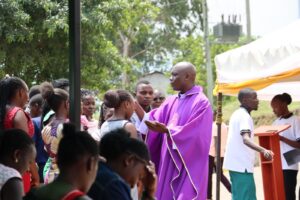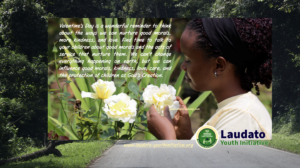In the heart of East Africa, a profound connection between the people and the Earth has existed for centuries. This relationship, steeped in the philosophy of Ubuntu and nurtured by traditional practices, offers a unique perspective on environmental stewardship. As the region faces unprecedented ecological challenges, there is an urgent need for the younger generation to embrace this heritage and take up the mantle of environmental preservation. This is not merely a practical necessity but an existential and philosophical journey that calls for a deep reconnection with our roots.
Ubuntu and the Sacredness of Nature
Ubuntu, a central tenet in many African cultures, extends its profound philosophy beyond human interactions to encompass the entire web of life. The phrase “I am because we are” captures the essence of this interconnectedness, emphasizing that our existence is intrinsically tied to the well-being of the environment. This holistic view recognizes every element of nature, trees, rivers, mountains, and animals, as part of a greater community deserving of respect and care.
From a philosophical standpoint, Ubuntu aligns closely with the concept of deep ecology, which argues for the intrinsic value of all living beings, regardless of their utility to human needs (Naess, 1973). This perspective challenges anthropocentric worldviews that prioritize human interests over ecological integrity. In the context of Ubuntu, the environment is not merely a backdrop for human activity but a co-equal participant in the web of life. This philosophy underscores a symbiotic relationship where one component’s health directly impacts the whole’s health.
Traditional African societies have long embodied this philosophy in their practices. Sacred groves, for example, are physical spaces where nature is left undisturbed and spiritual sanctuaries that reflect a deep reverence for the Earth. These groves serve as a testament to the ecological wisdom embedded in cultural traditions, highlighting a refined understanding of sustainability long before it became a global imperative (Gadgil & Vartak, 1975). By preserving these spaces, traditional societies recognize the need for balance and respect for natural processes.
Furthermore, the concept of Ubuntu resonates with the Gaia hypothesis proposed by James Lovelock, which posits that the Earth functions as a self-regulating, living organism (Lovelock, 1979). This hypothesis aligns with the African philosophical view that the Earth is a living entity deserving reverence and protection. Therefore, Ubuntu is not just a social ethic but an ecological one, advocating for a harmonious coexistence between humans and the natural world. The sacredness attributed to nature in African philosophy also parallels the notion of biocentrism, which holds that all life has inherent value (Taylor, 1986). This perspective is evident in how traditional African communities engage with their environment, fostering a relationship based on mutual respect and care. For instance, the rituals and practices surrounding sacred groves are expressions of this biocentric view, where nature is seen as a partner in life’s journey rather than a mere resource to be exploited.
Challenges Facing the Younger Generation
The ancient wisdom embedded in the philosophy of Ubuntu is increasingly at risk of being overshadowed by the forces of modernization, urbanization, and globalization. This shift has created a significant disconnect between the younger generation and the natural world, particularly in regions like East Africa, where environmental challenges such as deforestation, desertification, and climate change are becoming more pronounced. As young people become more immersed in the demands of a modern economy, they face the daunting task of balancing this new reality with the ecological wisdom passed down from their ancestors.
Philosophically, this disconnect can be seen as a consequence of the pervasive anthropocentrism that dominates contemporary thought, which often prioritizes human needs and technological progress over ecological balance. This worldview starkly contrasts Ubuntu’s holistic and interconnected perspective, which sees human beings as an integral part of the natural world, not separate from it. As environmental philosopher J. Baird Callicott (1989) argues, shifting our ethical framework from an anthropocentric to an ecocentric perspective is crucial for addressing the ecological crises we face today. Ubuntu provides a compelling model for such a shift, accentuating the importance of harmony and mutual respect between humans and the environment.
The challenge for the younger generation is to integrate the values of Ubuntu into their understanding of technological and economic progress. This requires a reawakening to the idea of the Earth as a sacred trust, a concept deeply rooted in traditional African thought. Viewing the environment as a sacred entity deserving of respect and care, young people can develop a more sustainable approach to development. As environmental ethicist Aldo Leopold (1949) suggests in his concept of the land ethic, seeing we as part of a larger community that includes the land can foster a sense of stewardship and responsibility essential for sustainable living.
Furthermore, integrating Ubuntu into modern education systems can play a pivotal role in bridging this disconnect. Incorporating ecological wisdom and the principles of Ubuntu into curricula, educators can help young people develop a deeper appreciation for the natural world and their place within it. This holistic education can empower the younger generation to become advocates for environmental stewardship, ensuring that technological advancement does not come at the expense of ecological integrity. Education should impart knowledge and cultivate an ethical relationship with the Earth, nurturing a sense of responsibility and care for the planet.
For the youth of East Africa, reconnecting with the Earth is not just an environmental issue; it is an existential imperative. This necessitates a philosophical shift in how we perceive our place in the world, embracing a more holistic and integrated worldview. Several vital steps can facilitate this reconnection:
1. Embracing Indigenous Knowledge: Traditional ecological knowledge, passed down through generations, offers valuable insights into sustainable living. This wisdom embodies the deep connection between humans and nature, reflecting the Ubuntu philosophy. As anthropologist Fikret Berkes (1999) argues, indigenous knowledge systems provide a foundation for sustainable environmental management. Young people must seek to learn from elders and integrate this wisdom with modern scientific approaches. This fusion of old and new can create innovative solutions to contemporary environmental problems, ensuring that development is both culturally relevant and ecologically sound.
2. Revitalizing Cultural Practices: Cultural practices such as maintaining sacred groves, observing agricultural rituals, and respecting wildlife are manifestations of the Ubuntu philosophy in action. These practices foster a sense of collective responsibility towards the environment, emphasizing that human well-being is intertwined with the health of the natural world. Baird Callicott (1989) argues that cultural practices are essential for cultivating an ecological conscience. By revitalizing these traditions, the younger generation can reinforce the values of respect and stewardship, creating a sustainable relationship with the Earth that honors ancestral wisdom.
3. Advocating for Policy Change: The younger generation must become advocates for environmental policies that respect both traditional knowledge and modern ecological science. This includes supporting community-led conservation efforts, sustainable agriculture, and the protection of natural resources. Philosopher and political theorist John Dryzek (2005) emphasizes the importance of deliberative democracy in environmental governance, where diverse voices, including those of indigenous communities, are heard and respected. Championing policies that integrate traditional ecological knowledge with contemporary science, young people can ensure that environmental governance is inclusive, equitable, and effective.
4. Fostering Community Engagement: Building strong, environmentally conscious communities is crucial for sustainable development. Ubuntu teaches that individuals thrive in the community context, and this principle can be extended to environmental stewardship. Young people should engage in local conservation projects, educate peers about environmental issues, and promote a culture of sustainability. As environmental educator David Orr (1992) points out, fostering ecological literacy and community engagement is essential for creating a resilient and adaptive society. The younger generation can create a sustainable future by nurturing a sense of collective responsibility and empowering communities to take action.
A Call to Action: The Future in Our Hands
As inheritors of a rich cultural legacy and stewards of the future, the youth of East Africa have a unique and vital role to play. Reconnecting with the Earth is a journey that demands both introspection and action. It challenges us to see the world through the lens of Ubuntu, recognizing that our well-being is tied to the health of our environment. In Swahili, this interconnectedness can be described as Umoja (unity), reflecting the idea that the health of one is the health of all. This philosophical and existential challenge calls for courage, creativity, and commitment. It is a call to embrace our roots, honor our heritage, and innovate for a sustainable future. Our Mother Earth is not a distant entity but a living community to which we belong. Reconnecting with the Earth allows the younger generation to create a more harmonious, sustainable, and just world. This concept aligns with the works of environmental philosopher Arne Naess, who advocates for deep ecology, emphasizing that the well-being and flourishing of human and non-human life on Earth have intrinsic value (Naess, 1973).
Reconnecting with the Earth also involves a profound respect for the wisdom of our ancestors. Indigenous knowledge systems, often communicated through stories, proverbs, and rituals, provide a holistic understanding of the natural world and our place within it. For instance, the Swahili proverb Maisha ni safari (Life is a journey) reminds us of life’s continuous and interconnected nature. Integrating this wisdom with modern scientific approaches allows the youth to develop innovative solutions that are culturally relevant and ecologically sustainable. Environmental philosopher Aldo Leopold’s (1949) land ethic, which emphasizes the need for moral responsibility to the natural world, can be a guiding principle in this endeavor.
The younger generation must also become advocates for policy changes that integrate traditional knowledge and modern ecological science. This includes supporting community-led conservation efforts, sustainable agriculture, and the protection of natural resources. In the words of environmental educator David Orr (1992), fostering ecological literacy is crucial for empowering communities to take action. Promoting policies that respect the environment and recognize the importance of traditional knowledge enables young people to help create a future where development and sustainability are in harmony.
In conclusion, the existential imperative of reconnecting with the Earth is a call to action for the youth of East Africa. By embracing the principles of Ubuntu, valuing Indigenous knowledge, advocating for inclusive policies, and fostering community engagement, they can face the challenges of the modern world while honoring their cultural heritage. As the African proverb goes, “The Earth is not ours; it is a treasure we hold in trust for future generations.” Let us rise to this challenge, for the future of East Africa and the planet depends on it.
References
Berkes, F. (1999). Sacred ecology: Traditional ecological knowledge and resource management. Taylor & Francis.
Callicott, J. B. (1989). In defense of the land ethic: Essays in environmental philosophy. SUNY Press.
Dryzek, J. S. (2005). The politics of the Earth: Environmental discourses. Oxford University Press.
Gadgil, M., & Vartak, V. D. (1975). Sacred groves of India: A plea for continued conservation. Journal of the Bombay Natural History Society, 72(2), 314-320.
Leopold, A. (1949). A sand county almanac. Oxford University Press.
Lovelock, J. E. (1979). Gaia: A new look at life on Earth. Oxford University Press.
Naess, A. (1973). The shallow and the deep, long-range ecology movement. A summary. Inquiry, 16(1-4), pp. 95–100.
Orr, D. W. (1992). Ecological literacy: Education and the transition to a postmodern world. SUNY Press.
Taylor, P. W. (1986). Respect for nature: A theory of environmental ethics. Princeton University Press.














